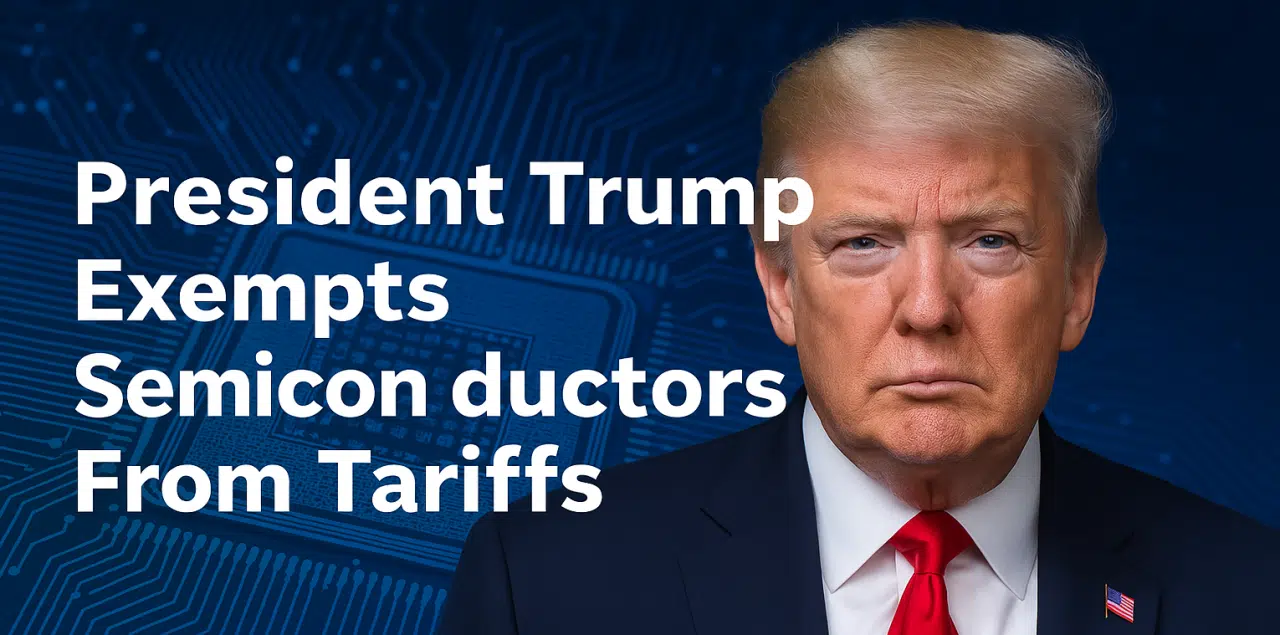The Trump administration has clarified that semiconductors are officially exempt from new reciprocal import tariffs, according to a memorandum issued Friday in connection with Executive Order 14257 and its recent amendments.

President Donald Trump signed Executive Order 14257 on April 2, 2025, declaring a national emergency over large and persistent U.S. goods trade deficits. The order imposed sweeping new ad valorem tariffs on hundreds of imported goods, but specifically excluded semiconductors due to their strategic importance.
On April 11, the White House released a follow-up memorandum clarifying the scope of this exemption.
“Semiconductors,” as defined under Executive Order 14257, includes dozens of products classified under the Harmonized Tariff Schedule of the United States (HTSUS)—covering integrated circuits, memory storage devices, processors, and specialized computing components.
HTSUS Classifications Included in the Tariff Exemption
The term “semiconductors” applies to a wide array of products under these HTSUS codes:
8471, 847330, 8486, 85171300, 85176200, 85235100, 8524, 85285200, 85411000,
85412100, 85412900, 85413000, 85414910, 85414970, 85414980, 85414995,
85415100, 85415900, 85419000, and 8542.
These product lines represent core components of everything from smartphones and data centers to electric vehicles and military technology.
Import Refunds and Retroactive Tariff Relief
Under the new directive, any tariffs collected on semiconductors after April 5, 2025 will be refunded through standard U.S. Customs and Border Protection procedures. Importers should review their filings for refund eligibility.
Additionally, the HTSUS will be formally updated to reflect the exempt product codes, ensuring that customs declarations accurately align with the new tariff rules.
Who’s Responsible for Implementation?
Per the memorandum, the Secretary of Commerce and U.S. Trade Representative, in coordination with federal security and economic policy officials, will implement the order under the authority of the International Emergency Economic Powers Act (IEEPA).
These actions also apply to follow-up Executive Orders:
- EO 14259 (April 8) – Amending duties for low-value Chinese imports
- EO (April 9) – Adjusting tariff rates in response to trading partner retaliation
Why the Semiconductor Exemption Matters
Semiconductors represent one of the most critical links in the global supply chain. Any disruption—especially through import penalties—would have major consequences for U.S. tech, defense, and automotive sectors.
By reaffirming the exemption, the administration is sending a signal of stability to domestic manufacturers, importers, and allies in the trade and technology sectors.
What Comes Next?
The HTSUS will be updated immediately, and importers can begin applying for refunds. More guidance is expected from U.S. Customs and the Department of Commerce in the coming days.
For now, industry leaders are applauding the decision to keep semiconductors outside the scope of retaliatory tariffs as the U.S. continues navigating a complex global trade landscape.
